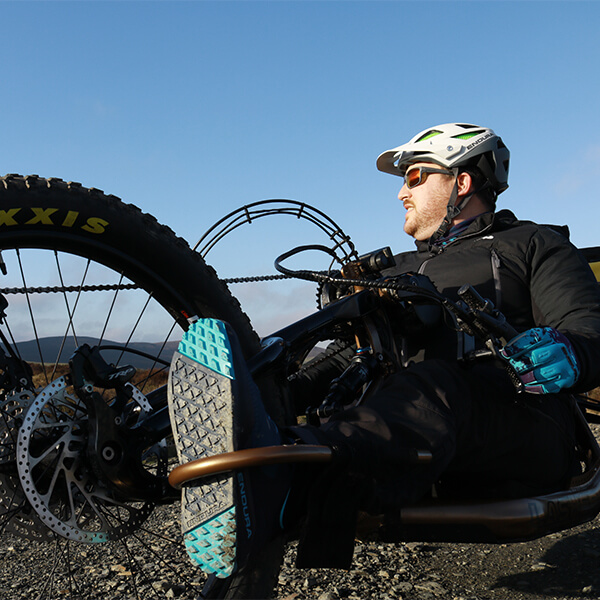
Hand Powered
Gravel Grinder
Hand cyclist Neil Russell loves the freedom cycling brings and clearly he loves a challenge. Having had his love of cycling rekindled by off-road gravel trails, he's planning an epic adventure around the islands of Scotland.
For all humanity's ingenuity, when it comes to converting human energy into forward motion, nobody has come up with anything better than the bicycle. It’s one of the most efficient machines ever designed. And the reason for this? Your thigh muscles are the biggest in your body and harnessing their output to a gear-driven chain works extremely well. Can you imagine trying to propel your bike using, say, your arm muscles? Those spaghetti-thin noodle-arm things? Unthinkable, right?
Well, say hello to Neil Russell who rides a hand-powered bike or, to be precise, a trike. If Neil wants to go for a bike ride – on or off-road – he's essentially powered by his arms, not his legs, having been born with Spina-Bifida and then a below-knee amputation of his right leg when he was 18. To be accurate, e-bike 'assist' batteries made a massive difference to hand bike pilots like Neil in recent seasons, but more of that later.
It wouldn't be too surprising if you had never come across anyone on any kind of hand bike, because they're not that common. The fact is that the issues which beset every cyclist apply to hand-cyclists too – lack of infrastructure, psychotic car drivers, potholed roads – all of which are compounded by a literal lack of road presence. If you feel like you're invisible riding a standard bike on the road, imagine what it’s like venturing out on a hand bike, where your backside is only a few inches from the ground? “I started riding on the roads and did it for a few years, but it was scary,” explains Neil. “Coming into a roundabout and trying to lock eyes on a car driver to make sure they've seen you – and you could tell they just weren't looking for a bike that low to the ground.”
Given their vulnerability, it’s no surprise that there are so few hand bikes on our roads. Which is precisely where off-road and gravel riding comes in. While Neil is working and advocating for better infrastructure on Tarmac, the sense of freedom that comes from riding off road, away from traffic, is obvious. Neil becomes almost evangelical in his enthusiasm. “Before I had my amputation, when I was at school, and then for a while afterwards I would ride a standard bike and living in Balloch when I was young meant I went everywhere. I had a limp from the Spina Bifida which made things tricky walking, but I could keep up with my mates on a bike, you just – go places you know? Just kids having 'adventures' on your bikes.”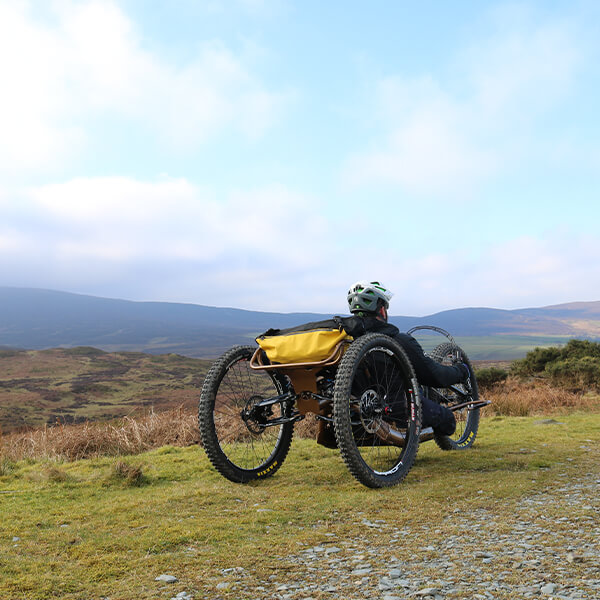
Riding with a prosthetic didn't work for Neil – “there were lots of sores” – and wheelchair racing was not for him. “For me, it was shit” he laughs, shaking his head at the memory, “I was, uh, so 'heavy' that my knees hit my stomach and made it hard to breathe, plus your position in the chair wrecks your shoulders. In the end, it's just going round and round and round in circles on a track, that's not my idea of a bike ride!” Neil insists that he is no kind of superhuman endurance athlete and has no desire to be an elite Paralympian either. He's a “normal bloke” riding a hand cycle off road.
Early forays around the Trossachs famous 'Gravelfoyle' routes saw new vistas and possibilities open up for Neil, particularly when e-assist battery technology took some of the effort out. “It's not an electric motorbike though, the clue is in the name – 'assist' – and you still have to work hard, but it does open up more potential and for those who are maybe less fit and a bit unsure, it’s a massive help.”
So, everyone should get on off-road hand cycles then? Ah, if only it was that simple. Deciding that riding on the road is both challenging and dangerous is one thing but acquiring a hand bike that's designed to be ridden off-road, on gravel trails is neither simple nor cheap. Given the small size of the market, mass-produced off-road hand bikes cost upwards of £4,000 and bespoke off-road e-assist machines are well north of £10,000. And they're not easy to store or transport either. Plus, as Neil concedes, gaining the confidence to get from wheelchair into your hand cycle isn't something that comes easily.
Launching yourself into the unknown and pedalling off down a gravel path on a hand bike clearly takes some effort, in every sense. “The thing is I reckon that lots of people in wheelchairs or who've suffered spinal injuries want to challenge themselves, they want to push themselves to see how far they can go – and that doesn't need to mean hard-core wheelchair racing and the dedication and training required. But it doesn't need to mean tackling a gnarly bit of singletrack on a hand bike either, going for a gravel ride might be enough – but we need to make both things possible, make it easier for people, even if they just want to give it a try.”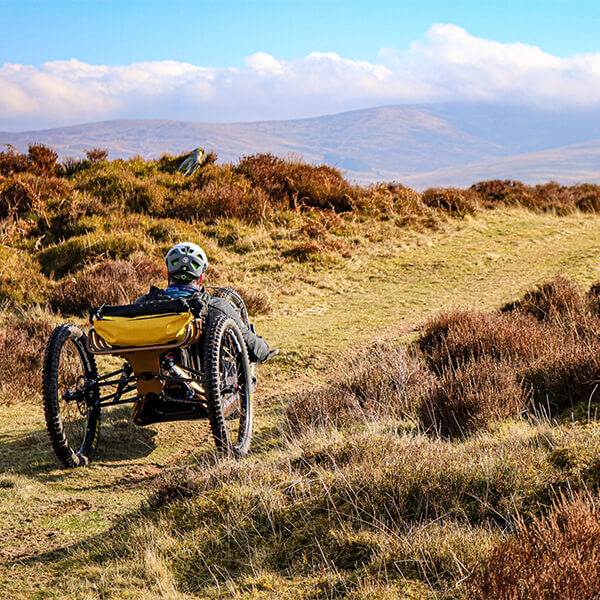
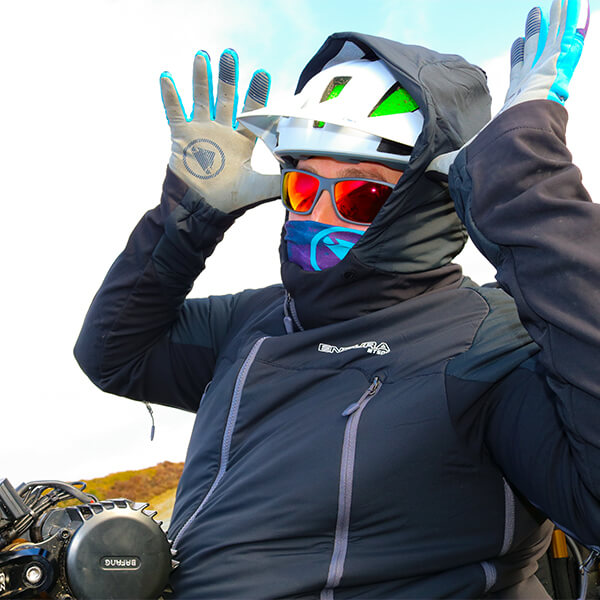
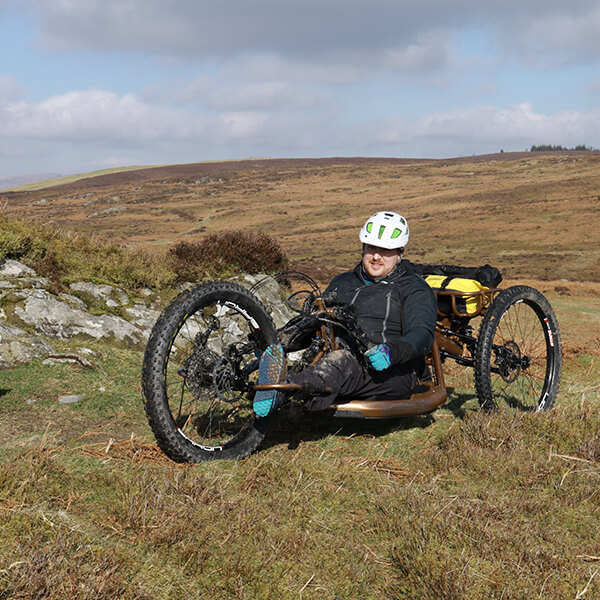
Neil works for Experience Community where he works to help disabled people to get outdoors and enjoying nature. Among other things Neil carries out consultancy work for organisations who want to make their outdoor facilities as welcoming as possible. “That could be anything from disabled toilets in car parks to removing unnecessary gates, finding work arounds for steps and steep sections. The thing with hand bikes is that most are front wheel drive, so you are basically pulling yourself up a hill and its easy to lose traction, so routes have to be designed with that sort of thing in mind too.”
When it comes to getting off the beaten track, that doesn't come much more un-beaten than in southern Africa. Neil and three other hand-cyclists were planning a route that will take them west-to-east across that continent, starting in Namibia and ending up in Mozambique via a 4,000km trek through Botswana, Zimbabwe and South Africa. “After nearly a year of planning that ended when the travel company disappeared with our deposits, so we had to knock it on the head.”
Undaunted, Neil is now planning a four-week hand-cycle tour of Scotland. There will not be lions, but there will be swarms of savage midgies and the challenges that the disabled face every day, everywhere – access to buildings and toilets – will be as bad in Badenoch as Botswana. “I want to show that with the right attitudes, disabled riders can overcome challenges and embark on adventures like everyone else.” It's still a project in the planning, made more complicated by Covid-19, but it is in keeping with Neil's guiding philosophy. “I'm just a guy who wants to ride his bike and get everyone else riding as well. The way I see it is that if people watch my videos and say 'Well, if he can do it, so can I.' There's nothing beats the sense of freedom you get from riding off road, getting to somewhere and a view that you've had to work to get to, off the beaten track.” The Trossachs national park or Kruger national park, I mean, how different can it be? It's all just gravel, right?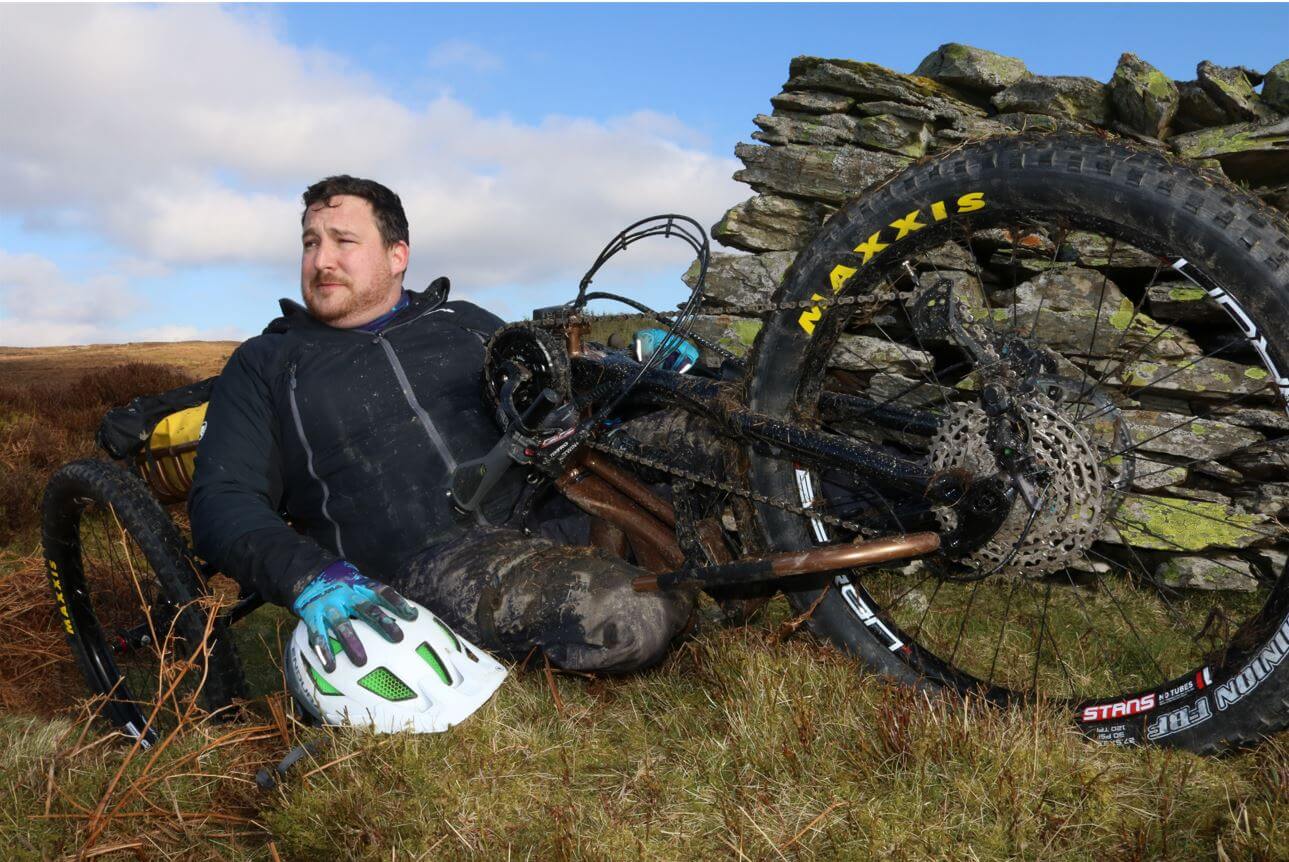
FOOTNOTES:
Words: Kenny Pryde / Photos: Jessica Paul / Location: North Wales, UK.